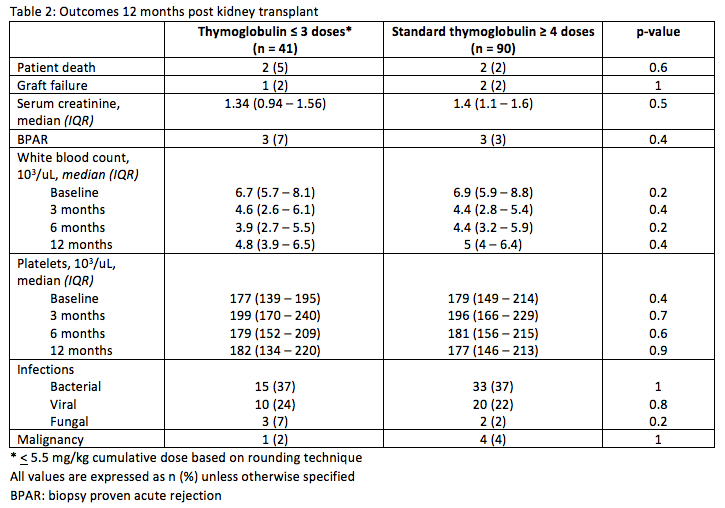Outcomes of Reduced Thymoglobulin Induction Dosing in Elderly Kidney Transplant Recipients at a Steroid Sparing Center
Pharmacy, NewYork-Presbyterian, New York, NY
Meeting: 2019 American Transplant Congress
Abstract number: B201
Keywords: Elderly patients, Immunosuppression, Induction therapy, Kidney transplantation
Session Information
Session Name: Poster Session B: Kidney Immunosuppression: Induction Therapy
Session Type: Poster Session
Date: Sunday, June 2, 2019
Session Time: 6:00pm-7:00pm
 Presentation Time: 6:00pm-7:00pm
Presentation Time: 6:00pm-7:00pm
Location: Hall C & D
*Purpose: Studies have demonstrated a mortality benefit with kidney transplantation (KT) in elderly patients, but there is little consensus over optimal immunosuppression. Older KT recipients may not require the same amount of induction or maintenance immunosuppression since immune function decreases with increasing age. This study investigates whether there is a difference in outcomes between standard (> 5.5 mg/kg) and reduced (≤ 5.5 mg/kg) dose rabbit anti-thymocyte globulin (rATG) induction dosing in elderly KT recipients at a steroid sparing center.
*Methods: This is a single center, retrospective study of KT recipients ≥ 65 years of age transplanted with rATG induction between 1/2011 and 12/2016. Maintenance immunosuppression included tacrolimus and mycophenolate mofetil 500 mg twice daily. Steroids were discontinued after 5 days. Primary outcomes were patient and graft survival at 12 months. Secondary outcomes include serum creatinine (SCr), incidence of biopsy proven acute rejection, infection, or malignancy at 12 months. White blood count and platelets were compared at baseline, 3, 6, and 12 months.
*Results: A total of 131 patients ≥ 65 years of age were included in the study. Baseline characteristics are shown in Table 1. Forty one patients received reduced rATG dosing. The median (IQR) dose in the reduced rATG group was 4.8 mg/kg (4.5-5.2 mg/kg) compared to the standard rATG group 6.5 mg/kg (6.1-7.1 mg/kg). There were no statistically significant differences between the two groups. As shown in Table 2, there was no difference in patient and graft survival. There were 13 total rejections in this population over the span of 5 years, however only 6 occurred within the first year. There was no difference in SCr or incidence of infection or malignancy. White blood count and platelets were similar between the groups.
*Conclusions: This study did not identify any major clinical differences between standard and reduced dose rATG induction in a steroid sparing center. Elderly patients may benefit from reduced dose rATG therapy with less potential adverse effects without increased risk of acute rejection. More research is needed to further explore the optimal immunosuppression regimens for the elderly population in KT.
To cite this abstract in AMA style:
Liu EC, Lee JH, Abramova R. Outcomes of Reduced Thymoglobulin Induction Dosing in Elderly Kidney Transplant Recipients at a Steroid Sparing Center [abstract]. Am J Transplant. 2019; 19 (suppl 3). https://atcmeetingabstracts.com/abstract/outcomes-of-reduced-thymoglobulin-induction-dosing-in-elderly-kidney-transplant-recipients-at-a-steroid-sparing-center/. Accessed February 18, 2026.« Back to 2019 American Transplant Congress


